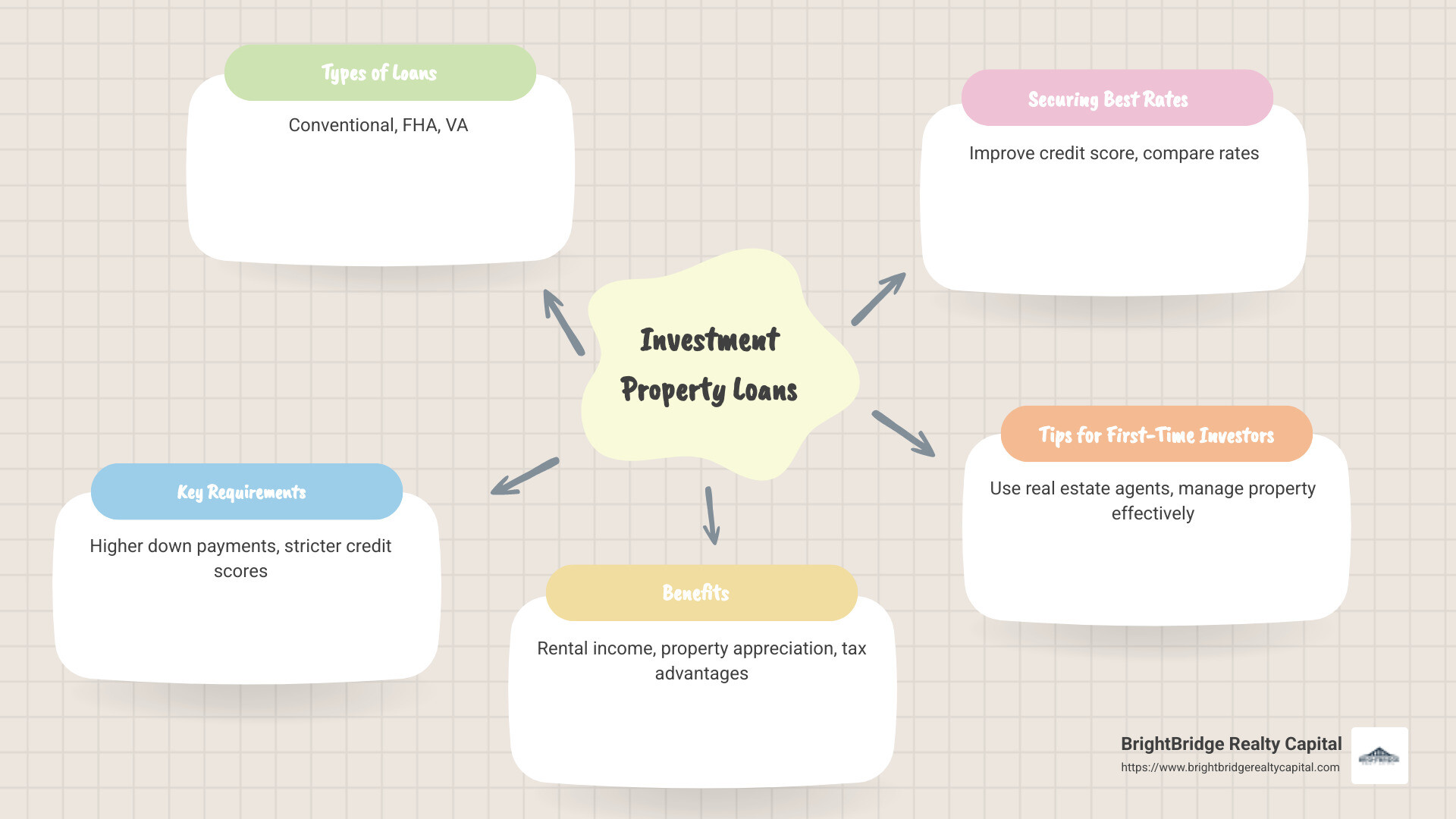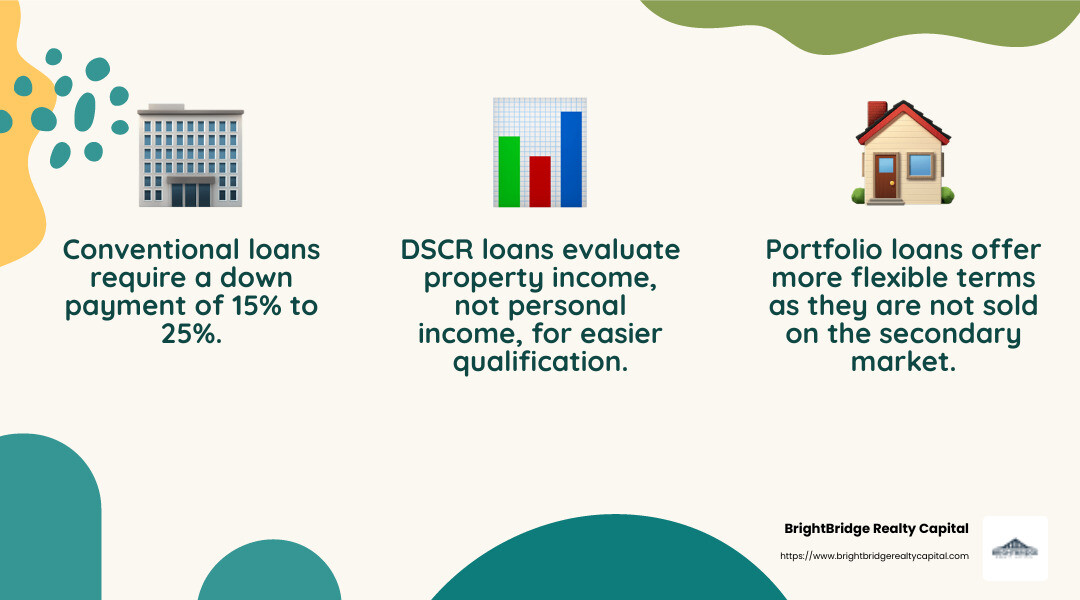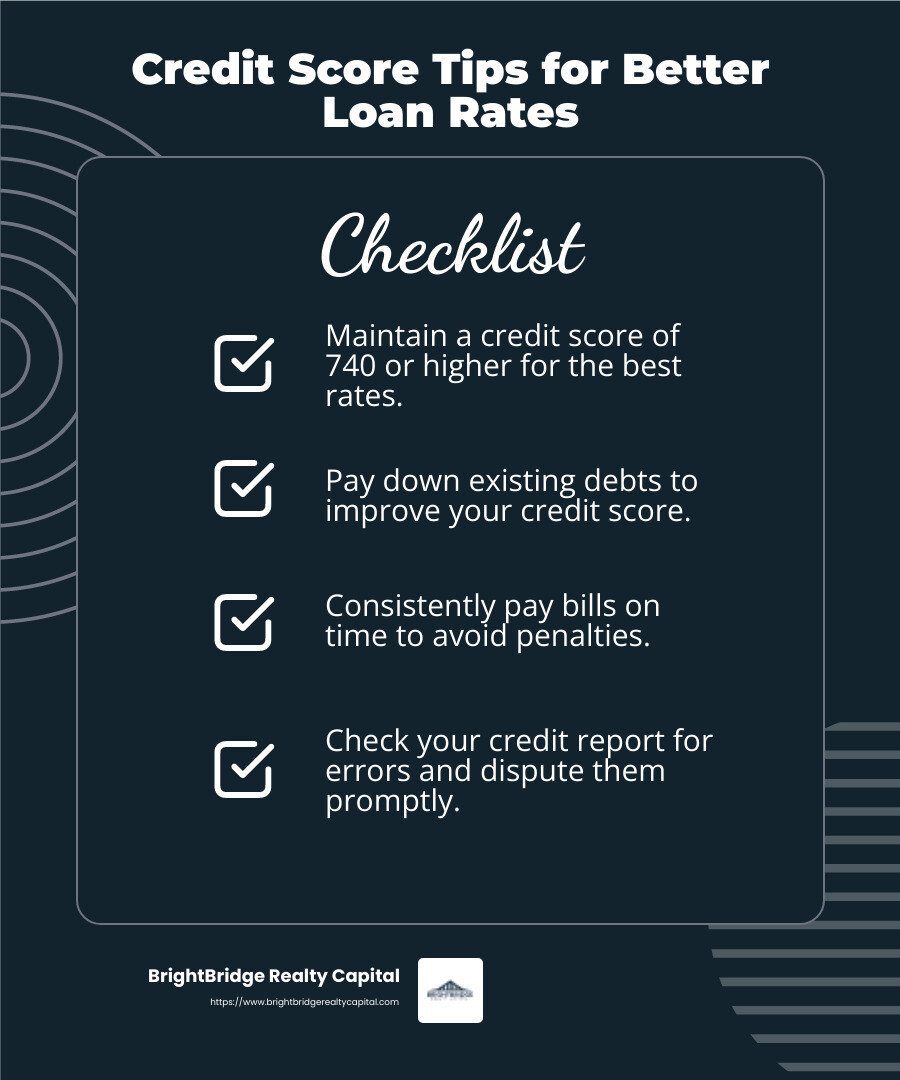Mastering Investment Property Loans: A How-To Guide

Investment property loans are crucial tools for any aspiring real estate investor seeking to maximize their returns and expand their portfolio. Whether you're flipping properties or building a collection of rental units, these specialized loans offer targeted financing options custom to the unique needs and challenges of real estate investment.
Here's what you need to know quickly:
- Types: Conventional loans, FHA loans, and VA loans each cater to different investment strategies.
- Requirements: Expect higher down payments and stricter credit score prerequisites compared to home loans.
- Benefits: Opportunities for rental income, property appreciation, and tax advantages.
Investing in real estate isn't just about purchasing properties—it's about understanding the best ways to finance them effectively. This ensures that you can leverage your investment for maximum benefit.
Investment property loans can significantly impact your ability to profit in the real estate market. By navigating the various loan options and requirements, you can strategically position yourself to make insightful and lucrative investment decisions. As you dive into this guide, you'll uncover how these loans can be your gateway to successful property ventures.

Investment property loans word guide:
Understanding Investment Property Loans
Navigating investment property loans can be daunting, but it's essential for maximizing returns in real estate. Let's break down the main types of loans and the key requirements you need to know.
Types of Investment Property Loans
Conventional Loans
These are the most common type of investment property loans. Offered by banks and other lenders, conventional loans are typically resold to Fannie Mae or Freddie Mac. They usually require a down payment of 15% to 25%. The main advantage? They are widely available and often come with competitive rates.
Portfolio Loans
Unlike conventional loans, portfolio loans are kept in the lender's portfolio and not sold on the secondary market. This means lenders can offer more flexible terms, which can be ideal if you don't meet the strict criteria for a conventional loan.
DSCR Loans
Debt-Service Coverage Ratio (DSCR) loans focus on the income generated by the property rather than your personal income. This can be beneficial if the property is expected to generate significant rental income, making it easier to qualify.

Key Requirements for Investment Property Loans
Mortgage Rates
Investment property loans typically come with higher interest rates compared to loans for primary residences. This is because lenders see these loans as riskier. Rates can be half a percentage point or more above those for a primary home loan.
Down Payment
Expect to put down more money than you would for a primary residence. A down payment of at least 20% is common, although some loans may allow for as little as 15% down. A larger down payment can sometimes secure a lower interest rate.
Credit Score
A strong credit score is crucial. Lenders generally look for a score of 740 or higher to offer the best rates. If your score is lower, you might still qualify, but expect higher interest rates.
Cash Reserves
Lenders often require you to have cash reserves to cover six to twelve months of mortgage payments. This provides assurance that you can continue making payments even if rental income temporarily stops.
Loan-to-Value Ratio (LTV)
The LTV ratio is a key factor. For investment properties, lenders often require a lower LTV, meaning you must have more equity in the property. This reduces the lender's risk and can result in better loan terms for you.
By understanding these loan types and requirements, you can better prepare yourself to secure the most favorable terms for your investment property. This knowledge is crucial as you move forward in your real estate investment journey.
How to Secure the Best Investment Property Loan Rates
When you're diving into investment property loans, getting the best rates can make a huge difference in your returns. Here are some smart strategies to help first-time investors secure favorable loan terms.
Credit Score Improvement
Your credit score is a major player in determining your loan rate. Lenders typically offer the best rates to those with a score of 740 or higher. If your score needs a boost, consider paying down existing debts, consistently paying bills on time, and checking your credit report for errors. Even a small increase in your score can lead to significant savings over the life of your loan.

Debt-to-Income Ratio (DTI)
Lenders use your DTI to assess your ability to manage monthly payments and repay debts. A lower DTI indicates that you have more income available relative to your debt obligations, which can lead to better loan offers. Aim for a DTI below 36%, including your new mortgage payment, to improve your chances of securing a favorable rate.
Rate Comparison
Don't settle for the first offer you receive. Mortgage rates can vary significantly between lenders. Compare quotes from at least three different lenders to find the best deal. This might include reaching out to banks, credit unions, or mortgage brokers. Remember to consider the APR, which includes lender fees and points, to get a true cost comparison.
Real Estate Agents
A knowledgeable real estate agent can be a valuable resource in your investment journey. They can help you find properties that fit your criteria and provide insights into local market trends. Their expertise can also be crucial when negotiating purchase prices, which can affect your loan terms.
Property Management
Managing a rental property can be time-consuming, especially for first-time investors. Hiring a property management company can help you maintain the property, handle tenant issues, and ensure steady rental income. This can be particularly beneficial if you own multiple properties or live far from your investment.
Rental Income
Lenders often consider rental income when assessing your loan application. If you're purchasing a property that already generates rent, this can bolster your application by demonstrating the property's income potential. Be prepared to provide documentation, such as current leases or rental income statements, to support your case.
By focusing on these areas, first-time investors can improve their chances of securing the best possible rates on investment property loans. This sets the stage for a successful and profitable real estate investment experience.
Pros and Cons of Investment Property Loans
Investment property loans can be a powerful tool for building wealth, but they come with their own sets of advantages and challenges. Let's break it down.
Pros
1. Tax Deductions
One of the biggest perks of owning an investment property is the tax benefits. You can deduct mortgage interest, property taxes, and even some operational expenses. For example, if you spend $20,000 on repairs and maintenance in a year, you can deduct that from your rental income. This can significantly reduce your taxable income, making your investment more profitable.
2. No Need to Live on the Property
Unlike loans for a primary residence, you don't have to live in an investment property. This flexibility allows you to choose properties based on potential rental income and market trends, rather than personal preferences. It also means you can own multiple properties and diversify your investment portfolio.
Cons
1. Higher Interest Rates
Investment property loans usually come with higher interest rates compared to primary residence loans. This is because lenders view these loans as riskier. For instance, the interest rate on an investment property loan could be 0.5% to 1% higher than a conventional home loan. This means higher monthly payments and more interest paid over the life of the loan.
2. Stricter Requirements
Getting approved for an investment property loan is often more challenging. Lenders typically require a higher credit score and a larger down payment, often at least 15-25%. You'll also need to show substantial cash reserves to cover potential vacancies or unexpected expenses. This can be a barrier for new investors who might not have significant savings.
3. Complex Management
Managing an investment property can be time-consuming and stressful, especially if you own multiple units. You'll need to handle maintenance, tenant issues, and legal requirements. While hiring a property management company can ease this burden, it also adds to your expenses.
Understanding these pros and cons can help you decide if an investment property loan is the right choice for your financial goals. Balancing the potential for passive income against the responsibilities and costs involved is key to making a successful investment.
Frequently Asked Questions about Investment Property Loans
What is the typical down payment for an investment property?
When it comes to investment property loans, the down payment is generally higher than for a primary residence. Most lenders require at least a 15-25% down payment. This is because lenders consider investment properties to be riskier. If you're planning to live in one unit of a multi-unit property, you might qualify for a lower down payment, sometimes as low as 3.5% with certain loan programs. However, for a typical investment property, be prepared to put down a significant amount upfront.
How do investment property loan rates compare to primary residence rates?
Interest rates for investment property loans are usually higher than those for primary residences. This is because lenders see investment properties as carrying a greater risk. Typically, you can expect rates to be 0.5% to 1% higher than those for a primary home loan. For example, if the interest rate for a primary residence is 6.65%, the rate for an investment property could be around 7.15% or higher. This difference can add up over time, affecting your overall return on investment.
Can I use rental income to qualify for an investment property loan?
Yes, rental income can be used to help you qualify for an investment property loan. Lenders often allow you to count up to 75% of the anticipated rental income toward your qualifying income. This can be a big help if you're close to meeting the lender's income requirements. However, you'll need to provide documentation, such as a current lease agreement or a rental schedule from an appraiser, to prove the property's rental potential. This can make it easier to qualify, especially if you're looking at a property with strong rental demand.
Conclusion
Navigating investment property loans can be complex, but with the right partner, it becomes much simpler. At BrightBridge Realty Capital, we specialize in providing customized real estate financing solutions nationwide. Our unique approach focuses on fast closings and direct lending, setting us apart in the industry.
Fast Closings: Time is of the essence in real estate. We understand the need for quick action, which is why we offer fast closings, often within a week. This speed allows investors to seize opportunities without delay.
Direct Lending: By cutting out intermediaries, we provide competitive rates and a seamless process. This means fewer problems and more straightforward transactions, giving you peace of mind.
Whether you're a seasoned investor or just starting, our team is dedicated to supporting your real estate journey. From fix-and-flip projects to building a rental portfolio, we offer flexible funding options custom to your needs.
Ready to take the next step in your investment journey? Explore our loan options and find how BrightBridge Realty Capital can help you achieve your real estate goals.


